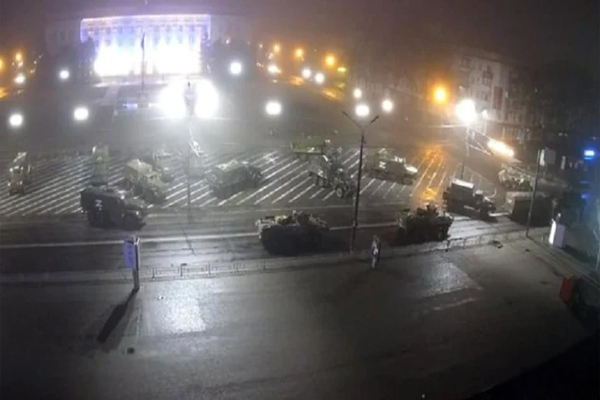
The Russia-Ukraine War Briefing.

By Carole LandryMarch 2, 2022

Russia advances in the south
Russia stepped up its military assault on Ukraine, pounding civilian targets in major cities and capturing Kherson in the south of the country near the Black Sea — the first major city to come under Russian control since the invasion began last week.
Attacks by Russian troops were reported on hospitals, schools and critical infrastructure in cities in Ukraine’s south and east, but fierce resistance continued.
Russian forces also surrounded the port city of Mariupol in the south of Ukraine. Mariupol’s fall would clear the way for pro-Russian soldiers in Crimea to join up with separatist forces in the east.
The mayor of Kherson, Igor Kolykhaev, said a group of about 10 Russian officers, including the commander of forces attacking the city, entered the city hall building today and informed him that they were planning to set up a new administration similar to those in the separatist enclaves in eastern Ukraine.
The fighting had left residents struggling with power outages and little food, the mayor said. As many as 300 people may have been killed in the battle for Kherson, he added.
“I’ve brought on volunteers to help gather up bodies and we’re burying them immediately because many of the bodies have been blown apart,” the mayor said.
After the fall of Kherson, anxiety was growing in Odessa, the country’s biggest port city, which is just over 120 miles away. Odessa is crucial for the country’s economic survival, and its fall would be the real prize for Russian forces advancing in the south.
Russia made fewer gains in the north and east, though supplies of food and water were running low in Kharkiv, Ukraine’s second-biggest city.
A 40-mile-long Russian military column remained stalled north of the capital Kyiv, in apparent preparation for a major offensive. U.S. officials said it had not made any appreciable progress in the past day as the Russian army continued to struggle with logistics problems.

Targeting the oligarchs
President Biden delivered a direct message to Russia’s billionaires in his State of the Union address last night: “We are coming for your ill-begotten gains.”
The U.S. and its European allies will “find and seize” the Russian oligarchs’ yachts, luxury apartments and private jets, Biden said, taking aim at critical allies of President Vladimir Putin. He announced the creation of a task force at the Justice Department “to go after crimes of the Russian oligarchs.”
Russia’s billionaires control roughly 30 percent of the nation’s wealth — compared with roughly 15 percent in Germany and the U.S. — and have about as much financial wealth stashed in offshore bank accounts as the entire Russian population has in Russia itself, according to a 2017 paper released by the National Bureau of Economic Research.
The U.S. and Europe have long turned a blind eye to Russian wealth, but Moscow’s invasion is changing that, and the billionaires seem to be feeling the wind turning.
Roman Abramovich, whose vast fortune transformed Chelsea into a global soccer powerhouse, is seeking to sell the team. The move was seemingly designed to distance the club from the impact of any possible financial sanctions against him.
Yesterday, the British government introduced legislation in Parliament to try to curb the gusher of dirty money into the country. London’s financial sector and expensive real estate sector have been used by Russian oligarchs for decades as a haven to stash their wealth.
Still, skeptics wonder how hard the British government will push, not just because British firms have benefited hugely from Russian cash, but also because oligarch donations have flowed to Prime Minister Boris Johnson’s Conservative Party.
In the U.S., Russian money has poured into big cities and the heartland in recent decades, often in the form of luxury villas and apartments. Members of the real estate community and lawmakers are skeptical that the government will be able to track down ownership because of large loopholes in disclosure requirements.
Several rich Russians were added to the E.U. sanctions list this week, which provides for an assets freeze. They include Alisher Usmanov, a multibillionaire with investments in mining, lumber and other ventures; Igor Sechin, the CEO of the state oil company Rosneft; and Mikhail Fridman, the founder of Russia’s largest private bank.
While many oligarchs released statements denouncing the sanctions, others sought cover. CNBC reported that at least four Russian mega-yachts had begun moving toward countries where they might be safe from seizure.
ADVERTISEMENTContinue reading the main story
What else we’re following
Analysis
- Most members of NATO and the E.U. are funneling arms into Ukraine.
- Russia reported that nearly 500 of its troops had been killed in the fighting in Ukraine. The mounting toll exposes a potential weakness for Putin.
- The outcome of the war is likely to shape the future of the Eastern Orthodox Church.
- The reaction to Russia’s invasion has been mixed across Asia.
- The Times On Tech newsletter ponders whether Big Tech should exit Russia.
- From Opinion: Thomas Friedman lays out three scenarios for how the war will end.
Other developments
- The E.U. is expected to grant temporary protection to all Ukrainians as it braces for an influx of four million refugees.
- H&M Group, one of world’s biggest retailers, said that it was temporarily pausing all sales in Russia.
- The U.N. General Assembly adopted a resolution condemning Russia’s invasion.
We also recommend:
- Ukraine boasts a massive deposit of lithium, a key ingredient to make batteries for electric cars.
nytimes.com 03 03 2022



